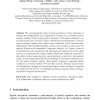Free Online Productivity Tools
i2Speak
i2Symbol
i2OCR
iTex2Img
iWeb2Print
iWeb2Shot
i2Type
iPdf2Split
iPdf2Merge
i2Bopomofo
i2Arabic
i2Style
i2Image
i2PDF
iLatex2Rtf
Sci2ools
105
click to vote
SPATIALCOGNITION
2010
Springer
2010
Springer
Human EEG Correlates of Spatial Navigation within Egocentric and Allocentric Reference Frames
We investigated the impact of path complexity on brain dynamics of subjects who preferentially use an egocentric (Turners) or an allocentric (Nonturners) reference frame during spatial navigation. Participants indicated a return bearing direction (‘point-to-origin’) following visual presentation of virtual tunnel passages, varying with respect to the complexity of the outbound path. High-density electroencephalographic activity was recorded continuously and spatially filtered with Independent Component Analysis. For Turners, rotations and translations were associated with decreased and increased (8-12 Hz) alpha activity in occipito-parietal cortex, whereas Nonturners displayed increased alpha within cortical areas along the ventral pathway, as well as in retrosplenial cortex, an area supporting bidirectional exchange of information between parietal and medial temporal regions. Both groups displayed complexity-related modulations of frontal midline (4-8 Hz) theta activity. Findings ...
Information Technology | Medial Temporal Regions | Spatial Navigation | SPATIALCOGNITION 2010 | Virtual Tunnel Passages |
| Added | 30 Jan 2011 |
| Updated | 30 Jan 2011 |
| Type | Journal |
| Year | 2010 |
| Where | SPATIALCOGNITION |
| Authors | Markus Plank, Hermann J. Müller, Julie Onton, Scott Makeig, Klaus Gramann |
Comments (0)

